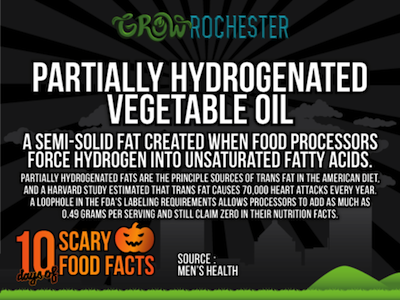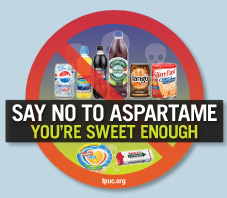by Jessica Justiniano for GreenBusinesses.com
 Raise your hand if quite often you find yourself confused when reading the ingredient list on a packaged food. “High-fructose corn syrup”? “Partially-Hydrogenated Oil”? “Aspartame”? Companies have no problem deceiving consumers into thinking they are purchasing something healthier, and then hiding the hurtful ingredients behind big words. Here is some insight into what you are reading on that package.
Raise your hand if quite often you find yourself confused when reading the ingredient list on a packaged food. “High-fructose corn syrup”? “Partially-Hydrogenated Oil”? “Aspartame”? Companies have no problem deceiving consumers into thinking they are purchasing something healthier, and then hiding the hurtful ingredients behind big words. Here is some insight into what you are reading on that package.
The easier the ingredient list to read, the healthier this product will be. A bag of potato chips, for example, should only mention potatoes and some sort of oil (canola preferably for it’s monounsaturated fats). However, oftentimes there are many other additives included. Food companies, at least the unhealthy ones, do not like to share what ingredients are in their foods, so the ingredient list must be decoded to understand what one is consuming.
Trans fat and partially-hydrogenated oil
Trans fat does not have to be claimed on the label if it is less than 0.5g per serving. So, read the ingredient list and check for “partially-hydrogenated oil”. Trans fat, the result of partially-hydrogenated oil, is created when hydrogen is unnaturally added to vegetable oil (Mayo Clinic, 2011). The effect on our body is drastic, causing plaque build-up in our arteries which, consequently, leads to heart attacks and heart disease – a number one killer in America.
Aspartame
 Aspartame is a low-calorie artificial sweetener added to many diet and “light” foods. Although the FDA does not yet consider this additive harmful, there have been numerous studies conducted on the effects of it on our bodies. Because this is a controversial synthetic ingredient, some companies try to hide it by calling it a different name. It can also be identified as phenylalanine and/or aspartic acid (US Department of Health and Human Services, 2010).
Aspartame is a low-calorie artificial sweetener added to many diet and “light” foods. Although the FDA does not yet consider this additive harmful, there have been numerous studies conducted on the effects of it on our bodies. Because this is a controversial synthetic ingredient, some companies try to hide it by calling it a different name. It can also be identified as phenylalanine and/or aspartic acid (US Department of Health and Human Services, 2010).
High-Fructose Corn Syrup
Another sugar additive, high-fructose corn syrup, is highly concentrated in fructose sugars. Although, not proven to be worse than other sugar additives, it is still recommended to limit your daily amounts of added sugar. It is encouraged to avoid high-fructose corn syrup, since it is so concentrated and must be processed in order to be used.
 Enriched
Enriched
This is found mostly in bread and grain products. “Enriched” refers to the process of removing the original nutrients and vitamins in the grain and synthetically adding certain vitamins back, instead of leaving it in its natural state. Although this does not sound that bad, the process leaves the grain in a different state than when harvested and is no longer as healthy to the digestive system as it was before due to the lack of proteins and other minerals originally taken out.
Always aim for whole grains, instead of enriched, because these grains have not been altered and will still contain most of the proteins, vitamins, and minerals naturally within them.
Overall, take all ingredients in moderation. Aim for whole grains and real sugars, instead of artificially made or enriched ingredients. Look out for those hydrogenated oils and fats and protect your heart. Hopefully, you are able to lower your hand now and have an easier time reading through that ingredient list to understand what you are eating.
References
Mayo Clinic Staff. (2011, May). Trans fat is double trouble for your heart health. Retrieved March 26, 2014, from Mayo Clinic website
Partially Hydrogenated Vegetable Oil [Photograph]. (n.d.).
[Ritz Ingredient List]. (2013, November).
[Say no to Aspartame]. (2011, November).
[Types of Grains Illustrated]. (2013, March).
U.S. Department of Health and Human Services. (2010, November). Aspartame: Questions & answers. Retrieved March 26, 2014, from National Toxicology Program website



